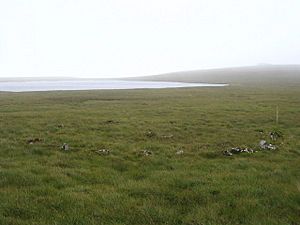Hjaltadans facts for kids
Quick facts for kids Hjaltadans |
|
|---|---|
| Native name Fairy Ring | |

A picture of the stone circle
|
|
| Location | Shetland, Scotland |
| Built | During the Neolithic Period |
| Architectural style(s) | British pre-Roman Architecture |
| Lua error in Module:Location_map at line 420: attempt to index field 'wikibase' (a nil value). | |
Hjaltadans, also known as Fairy Ring or Haltadans stone circle, is an ancient stone circle located on the island of Fetlar in Shetland, Scotland. This special place was built a very long time ago, during the Neolithic Period, which was a time when people first started farming and building large structures.
Discovering Hjaltadans
Hjaltadans is a fascinating historical site. It is a large circle made of 38 stones. Today, 22 of these stones are still standing upright. The entire stone circle measures about 37 feet (11.3 meters) across.
The Stone Circle's Design
Inside the main stone circle, there is another, smaller ring made of earth. This inner ring is about 26 feet (7.9 meters) wide. It has a gap of about 5 feet (1.5 meters) on its southwest side. Right in the very center of both rings, you'll find two tall, rectangular stone pillars. These pillars make the site even more mysterious and interesting.
The Legend of the Fairy Ring
The name Haltadans means "lame or limping dance" in the local language. This name comes from an old legend about the stone circle. The story says that the circle of stones was once a group of dancing trolls! The two stone pillars in the middle were a fiddler and his wife.
They were all having a great time, fiddling and dancing all night long. They were so busy that they didn't notice the sun was starting to rise. When the sun finally appeared, it turned them all into stone! This is why the site is also called the Fairy Ring, linking it to magical creatures and ancient tales.
 | Georgia Louise Harris Brown |
 | Julian Abele |
 | Norma Merrick Sklarek |
 | William Sidney Pittman |

